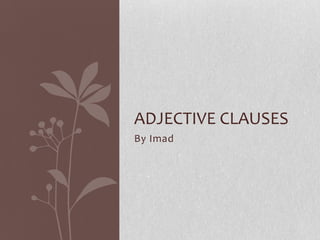
Adjective clauses with subject relative pronouns
- 2. Who, that, which, and whose. • Review Adjective clauses begin with a relative pronoun: Relative pronouns that can be the object of the clause are: SUB • Eva is a writer. She was born in Poland. • Eva, who was born in Poland, is a writer. OBJ • Eva is a writer. I saw her on TV. OBJ • Eva, who I saw on TV, is a writer. • FORM: OBJ RELATIVE PRONOUN + S + V • I like the food which she makes. • I like the food which they make.
- 3. WARNING! • Do NOT use a subject pronoun (I, you, he, she, it , we, they) and a object relative pronoun in the same clause: • She is the singer who I saw on TV • NOT: She is the writer who I saw her on TV.
- 4. Adjective clauses can be identifying and nonidentifying • An identifying adjective clause is necessary to identify the noun it refers to. • IDENTIFYING: I read a lot of books. The book which I just finished was very interesting. (The adjective clause is necessary to identify the noun it refers to (which book). NONIDENTIFYING: • I read a lot of books. This book, which I just finished, was very interesting. (I’m pointing to the book, so the adjective clause isn’t necessary to identify it. The clause gives additional information).
- 5. When do we leave out the object relative pronoun? • In an identifying adjective clause, we can often leave out the object pronoun. • The book which I just finished is great. OR • The book I just finished is great. • BUT DO NOT leave out the object relative pronoun in a nonidentifying adjective clause • This book, I just finished, is great. • This book, which I just finished, is great. CORRECT
- 6. Who(m), that, which, and whose • WHOM, WHO, OR THAT for people • You can also LEAVE OUT the relative pronoun. (WHEN NO COMMAS) • Which or That for things. You can also leave out the relative pronoun. (WHEN NO COMMAS) • Whose + noun to show possession. You CANNOT leave out the relative pronoun. • She’s the writer who/whom I met. • She’s the writer I met. • I read the book which/that she wrote. • I read the book she wrote. • That’s the author whose book I read. • NOT: That’s the author book I read.
- 7. Who(m), that, which, and whose with prepositions • The relative pronouns Who(m), that, which, and whose can be the object of a preposition: • REMEMBER: DO NOT leave the relative pronoun with whose • He is the writer. I work for him. • He’s the writer for whom I work. (formal) • OR • He’s the writer who I work for. (informal) • OR • He’s the writer I work for. *less formal • He’s the writer. I work for his wife. • He’s the writer whose wife I work for.
- 8. WHEN and WHERE • When and where are also used to start an adjective clause • When or that for time • I remember the day when/that I met you. • Where – place That’s the library where she works. • NOTE: You CAN leave out when and that in identifying adjective clauses ( NO COMMAS)
- 9. Source • Focus on Grammar 4 - 2011
